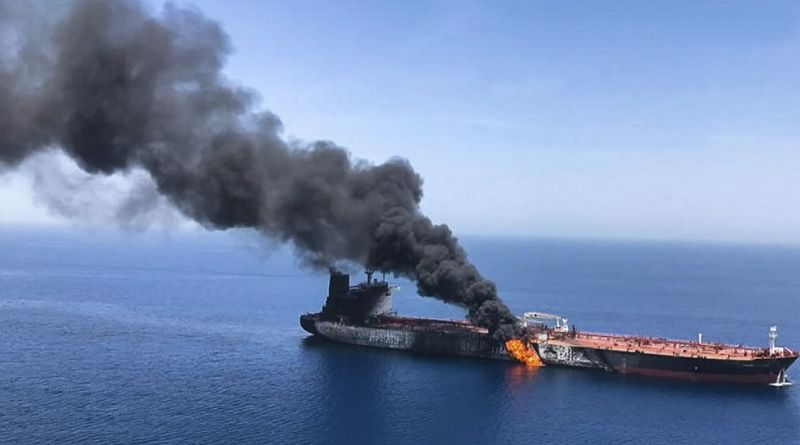In the event of escalating tensions in the Middle East, weapons manufacturers are set to profit, writes Daniel Safi.
AS NEWS FILTERED THROUGH last week that tensions in the Persian Gulf were reaching new highs in the aftermath of the oil tanker attacks and the shooting down of a U.S. drone, “defence” stocks shot up, as the outlook for war seemed bright.
Between Monday and Friday last week, Northrop Grumman’s stock price rose from 308.88 USD to an almost 52-week high of 324.89 USD.
Lockheed Martin went from 347.29 USD on Monday to 362.86 USD by Thursday evening.
And Boeing stocks rose from 348.50 USD on Monday morning to 374.76 USD by Thursday afternoon. Indeed, a war might just be the medicine Boeing needs to mitigate the recent impact on its commercial operations.
Allegations with no facts to back it up! give the the U.S. a reason for a war! yup start buying stocks in defence. its all about the money! would you put your son or daughter or husband to Iran when this President don't believe in its own... https://t.co/rncJYjiodx
— Richard DeLeon (@kalehuamanao) June 14, 2019
Even Raytheon’s stock price, the manufacturer of the drone that was shot down off Iran’s coast, went up then down then up again, reaching 182.79 by close of trade on Friday from 176.91 on Monday morning.
In all four examples here, the highs of Thursday dropped off slightly as it became clear Trump was too weak to start a war.
At times like these, when we are literally a nod or an infantile ego away from finding the world has worked itself into yet another catastrophic war, it is barely observed that extremely powerful and influential actors will profit, grow and prosper in the event of war — the “defence” industry.
The defence industry spent over 125 million USD on lobbying in the U.S. capital last year alone.
Recently, we've had statements like this from Senator Lindsay Graham:
“Here’s what Iran needs to get ready for: severe pain, inside their country… If they’re itching for a fight, they’re going to get one.”
“Whatever Iran thinks they can do to the United States or our security partners in the region we can do tenfold to them. One hundredfold to them.”
It's statements like these that begin to make sense in light of the huge sums the defence industry puts towards lobbying.
EXCLUSIVE: Trump: I do not need congressional approval to strike Iran https://t.co/PNmgPqcyai McConnell and @Jim_Jordan and @LindseyGrahamSC make it clear if he strikes Iran w/o consent of Congress that he will be impeached and that @GOP will initiate it!
— SecretSquirrel (@sparks_randi) June 25, 2019
To say the very least, this makes a mockery of the war powers democratically invested in politicians.
Trump went into the 2016 Election highly critical of U.S. involvement in the Middle East. This message proved popular with the American people. And, until now, Trump’s presidency has not delivered on this sentiment.
But in the aftermath of Trump’s decision on Friday to abort strikes against Iran, media outlets across the U.S. – CNN, The Washington Post, CBS – seemed none too happy about his decision, variously suggesting the decision reflected weakness, incompetence and a victory for Iran.
‘Iran Calls Trump’s Bluff’, says a headline from The Washington Post.
‘Trump’s Explanations Don’t Add Up’, says CNN’s Erin Burnett in a video piece.
CBS even invited former Admiral and now board member of defence giant Raytheon, James A. "Sandy" Winnefeld Jr, to tell viewers the U.S. will lose credibility if it doesn’t respond. He didn’t mention that Raytheon will lose some profits.
What about the possibility of a war that could devastate millions of lives, bring wholesale destruction to a region already suffering, create even more fertile ground for ISIS and like groups and more dangers for Western interests in the region and globally? A small price to pay, apparently, so the U.S. can maintain credibility, for Trump’s explanations to add up and, most of all, to keep those stock prices high.
To their credit, these outlets also included content commending the decision not to bomb.
For the moment, the very real possibility of catastrophic war was just avoided. Let’s hope Trump’s feet stay cold and the war profiteers fail to convince.
Daniel Safi has an honours degree in history and politics and now works as a music teacher.CBS News "War Expert" Is Being Paid By Raytheon https://t.co/KXlsSKJh75 the US backed off because all of Iran's missles are pointed at Israel... Jerusalem would been turned to dust...
— patrick lynch (@plynch1036) June 24, 2019
I, and I alone, can disgrace myself and the country #morintoon #TrumpConcentrationCamps #Trump30Hours #Trump2020 #TrumpDrunkOnPower #TrumpIran #TrumpForeignPolicy pic.twitter.com/RfUDpIyeri
— Jim Morin (@MorinToon) June 25, 2019
 This work is licensed under a Creative Commons Attribution-NonCommercial-NoDerivs 3.0 Australia License
This work is licensed under a Creative Commons Attribution-NonCommercial-NoDerivs 3.0 Australia License
Support independent journalism Subscribe to IA.












